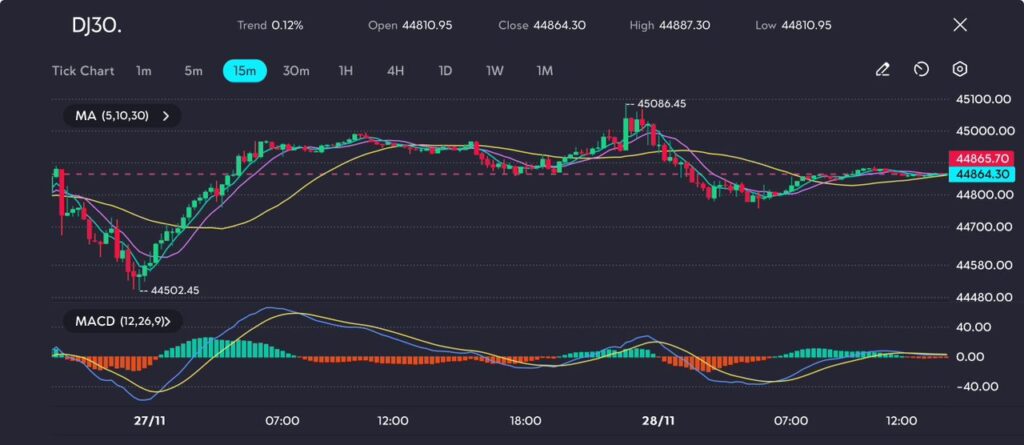Key Points:
- DJ30 hits a four-week high, testing resistance levels near 34,800.
- U.S. economic data showing robust growth, but inflation remains a key concern.
- Global geopolitical tensions, especially in the Middle East, influence market sentiment.
The Dow Jones Industrial Average (DJ30) climbed to its highest point in the last four weeks, reaching near 34,800, following a rally spurred by optimistic economic data and speculation around potential policy shifts.
As the markets gear up for key events, including the upcoming OPEC+ meeting and U.S. inflation reports, traders are navigating a mix of global uncertainties and the latest data on U.S. economic growth.
U.S. Economic Data Fuels Investor Confidence
A recent batch of U.S. economic data has reinforced investor confidence, especially in the context of a relatively resilient labour market and growth prospects in key sectors.
However, inflation concerns remain on the horizon, with the Federal Reserve’s next steps under scrutiny. The release of the U.S. GDP growth figures for Q3 and the latest consumer sentiment data has added to the optimism surrounding economic resilience, but inflation data in the coming weeks may dictate the trajectory for markets in the short term.

As the chart highlights, DJ30 has been testing critical resistance levels, with the 34,800 mark serving as a key hurdle. A break above this could signal a further upside, particularly if U.S. inflation prints come in line with expectations for a soft landing in the economy.
Middle East Tensions Weigh on Sentiment
Escalating tensions in the Middle East—especially following the U.S.-brokered ceasefire between Israel and Hezbollah—have added a layer of uncertainty to global markets.
While oil prices showed a steadying trend after the ceasefire announcement, the DJ30 remains susceptible to shifts in investor sentiment, especially as any disruption in oil production could impact global growth forecasts.
See also: Oil Steadies with Ceasefire and OPEC+ Meeting
The DJ30 chart also indicates some increased volatility, which may reflect the heightened geopolitical risks and uncertainties in the global political landscape.
As these risks evolve, the market will continue to react to new developments, making it crucial for traders to continue monitoring movements in the Middle East and across the Black Sea.
Potential OPEC+ Output Decision Looms Large
The upcoming OPEC+ meeting could provide further market direction. With oil markets experiencing mixed signals, investors are closely watching the potential for any policy changes regarding oil output.
Sources suggest that OPEC+ may consider deferring an oil output increase originally planned for January. This decision could have broader implications for global inflation, which, in turn, would influence central bank decisions on interest rates.
For the DJ30, which contains a significant number of energy sector stocks, the outcome of this meeting could provide a catalyst for either upward or downward movement, depending on how oil prices are impacted.
The correlation between energy prices and broader stock market performance remains strong, making any significant changes in energy policy a key risk factor for investors.
Dollar and Bond Tug-Of-War Persists
The recent dip in U.S. Treasury yields and the weaker dollar have supported risk assets, including the DJ30. However, markets remain on edge regarding potential rate hikes, as indicated by the Federal Reserve’s upcoming decisions and the latest economic reports.
Inflation readings due later in the week will shape expectations for the Federal Reserve’s December meeting. A soft inflation print would likely support the current trend of easing rate cut expectations, helping fuel the rally in stocks. However, if inflation shows signs of stickiness, the Federal Reserve could act more aggressively, which may dampen investor sentiment.
Key Levels and Market Watch
As the DJ30 approaches the critical resistance at 34,800, market participants are closely watching the intersection of U.S. economic data, developments, and central bank policy shifts.
With the potential for volatility in the coming weeks, traders are advised to monitor the upcoming inflation data and any further developments, particularly in the Middle East and energy markets.
Whether the Dow can break above its current resistance will likely depend on how the data pans out and whether any major global risks or inflationary pressures arise.









